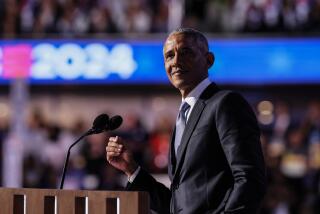It’s Something Exceptionalist
- Share via
One thing you can count on: When times get tough, Americans will crowd around a ready optimist. Optimism is woven into the very fabric of Old Glory, an essential part of our self-made, self-sustaining mythology.
With an election campaign taking shape in the distance, this may be an opportune moment to acknowledge that the U.S. also is a country quick to snub its doubters and its scolds.
“In every American there is an air of incorrigible innocence,” observed the British poet A.E. Houseman. His remark was meant as criticism. But how many Americans would take it so?
The latest Los Angeles Times poll recorded 77% support for the war and 68% approval of President Bush. Yes, there is tradition and instinct at work here. Americans tend to rally behind their troops and commander in chief in wartime. But there is more to these numbers. If you listen to the individual voices in this sampling, or any of the others, you find people embracing the war in grand terms: a quest for a better Iraq, a better Middle East, a better world, a more secure United States.
The French, the Russians, the “Arab street,” as well as a vocal minority of domestic protesters, may see the advance of U.S. armored divisions as dangerous manifestations of global arrogance and regional naivete. Not so, it seems, a majority of Americans, undaunted by those who know better.
Back to politics. Here at home, conservatives are mining this vein of American optimism and prospering as a consequence.
Mark Kann, chairman of the political science department of USC, says this is a traditional partisan advantage at moments of international engagement: “Conservatives always have been optimistic about the status and furtherance of America compared to the rest of the world. There is a whole body of literature on what is called ‘American exceptionalism.’ The idea of a shining city on the hill.”
Romantic? Perhaps. But I believe that cynics -- and I’ll include myself here -- owe it to our ideas, and our hopes, to pay fresh respect to that part of the American character. Not that optimism is always the avenue to political success. But sometimes it is; and at those moments, it’s hard to convince Americans of anything except their exceptionalism.
When citizens came to doubt their future in the 1980s, Ronald Reagan appealed to the nation’s sense of optimistic renewal. It was “morning in America,” and nothing else mattered nearly so much. In the 1990s, Bill Clinton gave optimism to a citizenry knocked off balance by global economic competition and technological change. Out of uncertainty, he promised that Americans could find opportunity. George W. Bush, who has neither Reagan’s sunny disposition nor Clinton’s empathy, seems to have fashioned his own kind of hardheaded, can-do optimism out of the Sept. 11 terrorist attacks.
Today, the language of Bush and his conservatives is spoken in high notes of expectation: liberation, freedom, security, possibility. Opponents find themselves bogged in something of a rhetorical quagmire, stuck with words like mistake, immoral, imperialist, failure, fraudulent, cynical, doom.
An optimist, as the old wheeze goes, sees opportunity in calamity, while a pessimist finds calamity in opportunity. Thus far, Bush’s opponents have failed to match his optimism with much more than the gloomy promise of worse to come.
That won’t do. The upcoming elections are the most keenly anticipated in a generation, and for good reason. Our diplomatic compact with other nations of the world and our social compact with ourselves are in play. The nation hasn’t just taken a turn, but a high-speed hairpin.
In an essay titled “Paradox and Dreams,” John Steinbeck described the American dream as “our vague yearnings toward what we wish we were and hope we may be: wise, just, compassionate, and noble.”
For our national political debate to bloom and bear fruit, for it to be worthy of all that is at stake, these wishes and hopes will have to be nourished. The choices offered to voters will have to acknowledge, as Steinbeck added, “the fact that we have this dream at all is perhaps an indication of its possibility.”
More to Read
Get the L.A. Times Politics newsletter
Deeply reported insights into legislation, politics and policy from Sacramento, Washington and beyond. In your inbox twice per week.
You may occasionally receive promotional content from the Los Angeles Times.










